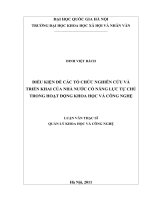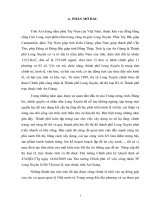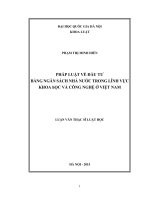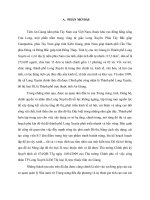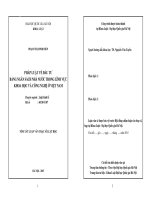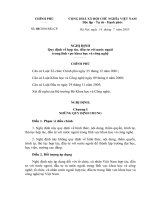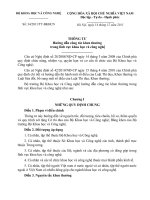Quản lý nhà nước về hợp tác quốc tế trong lĩnh vực khoa học và công nghệ tt tiếng anh
Bạn đang xem bản rút gọn của tài liệu. Xem và tải ngay bản đầy đủ của tài liệu tại đây (274.59 KB, 34 trang )
MINISTRY OF EDUCATION
MINISTRY OF HOME
AND TRAINING
AFFAIRS
NATIONAL ACADEMY OF PUBLIC ADMINISTRATION
LƯƠNG VĂN THẮNG
STATE MANAGEMENT ON INTERNATIONAL
COOPERATION ON SCIENCE AND TECHNOLOGY
Major:
Public Management
Code:
9 34 04 03
SUMMARY OF DOCTORAL
DISSERTATION
HANOI, 2020
The works is completed in: NATIONAL ACADEMY OF
PUBLIC ADMINISTRATION
Scientific supervisors:
1. Assoc. Prof. Le Thi Van Hanh
2. Assoc. Prof. Tran Quoc Thang
Opponent 1: ..............................................................................................
...................................................................................................................
Opponent 2: ..............................................................................................
...................................................................................................................
Opponent 3: ..............................................................................................
...................................................................................................................
The dissertation shall be defended in front of Academy-level Review
Council
Location:
Conference
room,
National
Academy
of
Public
Administration – No. 77 – Nguyen Chi Thanh – Dong Da District,
Hanoi City
Time: At………….on …….day………….month…………..year
The dissertation is available at the National Library of Vietnam or the
Library of National Academy of Public Administration
LIST OF THE AUTHOR’S SCIENTIFIC WORKS PUBLISHED
IN RELATION TO THE DISSERTATION
1. Luong Van Thang "Thinking about some new features in
international cooperation on Science and Technology"; Vietnam
Journal of Science, Technology and Engineering (ISSN 1859 - 4794),
Issue No. 640 (9/2012), the 54th year, Pages 52-55
2. Luong Van Thang, "Thinking about a new public management model
and its applicability in science and technology management in
Vietnam"; Vietnam Journal of Science, Technology and Engineering
(ISSN 1859-3801); Volume No. 6, Issue No.1 (2017), Pages 1-13.
3. Luong Van Thang, “"Some trends of international cooperation on
science and technology”, The Review of External Information (ISSN
1859-2899), Issue No. 96 (10/2017), Pages 29-33.
4. Luong Van Thang, “International cooperation in the field of science
and technology in Vietnam”, The Review of External Information
(ISSN 1859-2899), Issue No. 104 (6/2018), Pages 13-17.
PREFACE
1. The necessity for researching the topic
"Foreign affairs is the extended arm of domestic affairs." It is
understood that international cooperation is a significant channel
to join forces with domestic resources for successful
implementation of the national policies. The international
cooperation in the field of science and technology (Science &
Technology) also plays such an important role. In each phase of
Vietnamese socio-economic development, science & technology
have always been defined as the leading motive force, foundation
and national policy. Science & technology plays a key role in
developing a modern production force, improving productivity,
quality, efficiency, development speed and competitiveness of
the economy. Hence, the international cooperation has become an
inseparable part of science & technology development. The
international cooperation on science & technology contributes
to upgrading the domestic research level, shortening the
technological gap with the world, improving technical
infrastructure, and strengthening the scientific & technological
potential for vietnam. Furthermore, the international
cooperation on science & technology is a component of the
country's diplomatic activities.
In the recent years, especially since the first law on science &
technology was established in 2000, the international
cooperation on science and technology has achieved the certain
efficiency. However, the result of this operation is still not as
expected. The State management of this operation is facing with
a number of major challenges that directly impact on the
effectiveness and efficiency of international cooperation on
science and technology, namely (i) the overlap between State
management on science & technology, foreign, economic and
security branches has not promoted the formation of a smooth
1
corridor for international cooperation. (ii) the apparatus involved
in State management has many clues and intermediary
administrative organizations has created certain obstacles; (iii)
the system of legal documents that directly or indirectly governs
the international cooperation on science and technology makes
it difficult to separate and lacks a transparent and long-term
strategy; (iv) the public financial mechanism is not strong
enough and not appropriate to the specific characteristics to
maximize the effectiveness of international cooperation on
science and technology. In term of therory, the State
management of international cooperation on science &
technology is a narrow corner in the study of public
management, so there have been no many works with overall
referrence to this content so far. Therefore, research for
renovatation of the State management of international
cooperation on science and technology for Vietnam in the
coming period becomes very necessary.
2. The purpose and duty of the research:
2.1. The purpose of the research:
(i) Find out the fundamental principles for organizing and
operating the State management of international cooperation on
science & technology.
(ii) Point out the renovation solutions for the State
management of international cooperation on science &
technology in Vietnam in the period of 2018-2030.
2.2. The duty of the research:
(i) Researching the theoretical basis of
- International cooperation on science & technology
(concept, characteristics, content).
- State management of international cooperation on science
& technology (concept, characteristics, fundamental principles
for organizing and operating State management of international
cooperation on science and technology).
2
(ii) Study experiences of some countries in the world and
lessons for Vietnam related to State management of
international cooperation on science & technology.
(iii) Study the actual status of State management of
international cooperation on science & technology in Vietnam
in the period of 2000 - 2017; and analyze, assess the strengths
and limitations affecting the State management of international
cooperation on science & technology in Vietnam.
(iv) Study the objectives and orientations of the
international cooperation on science and technology in
Vietnam, some major trends in the world affecting the national
science & technology development.
(v) Apply the theoretical basis of the principles in the State
management of international cooperation on science &
technology to propose the solutions for renovation of the State
management thereof in Vietnam in the period of 2018 - 2030.
3. The object and scope to be researched:
3.1. The research’s object:
The State management of international cooperation on
science & technology.
3.2. The scope to be researched:
+) In respect of the content: in general, the State
management in the branches and fields includes many contents.
However, within this dissertation, the author only focuses on
researching three key groups of issues related to the State
management of international cooperation on science &
technology: (i) power allocation and organization of the
management apparatus; (ii) development of a system of
management document; and (iii) public financial mechanism.
For implementation, the author divides the dissertation into 4
parts including: (i) the overview of domestic and overseas
research situation; (ii) theoretical basis; (iii) actual status in
Vietnam; (iv) Solutions for innovation of the State management
of international cooperation on science & technology in
Vietnam. In particular, besides the "Overview of the research",
3
the 3 remaining parts of focus on in-depth analysis into the
three groups of issues mentioned above.
+) In respect of the time: the period from 2000 (since the
first law on science & technology was established) to 2030
(from the time ended the scientific & technological strategic
vision to 2030).
+) In respect of the space: the State management of
international cooperation on science & technology in Vietnam
4. Methodology and research method
4.1. Methodology: Dialectical materialism, historical
materialism; Ho Chi Minh's thoughts on foreign affairs; the
Party's viewpoints on State management, organizational
structure, vision and development orientation of Vietnam.
4.2. Methods: Researching method of the secondary
documents, social surveys, interviews from the experts, history,
analysis, comparison and summary, forecasts, observations, ...
5. Research questions and scientific hypotheses
5.1. Research questions:
(i) In which principles is the State management of
international cooperation on science & technology organized
for implementation?
(ii) In the period of 2018 - 2030, what are the fundamental
solutions for renovation of the State management of
international cooperation on science & technology in Vietnam?
5.2. Scientific hypotheses:
(i) The State management of international cooperation on
science and technology should be implemented in the following
principles:
- Firstly: Combination between centralization and
decentralization of power and organizationation of management
apparatus, in which including power contralization,
concentration of a few contents, promoting decentralization
thoroughly;
- Secondly: Synchronize macro regulations, simplify macro
regulations in the system of management documents;
4
- Thirdly: Create a public financial mechanism that enables
to simultaneously utilize the "repulsive force" and "attractive
force" of the budget and allocates finance based on outputs.
(ii) In the period of 2018 - 2030, the State management of
international cooperation on science and technology in Vietnam
need be renovated in accordance with the following orientations
and solutions:
- For the allocation of power and organization of apparatus:
State management agencies should only retain the rights to
make decisions for a few contents, synchroneous & direct
decentralization to units/organizations currently operating
international cooperation on science & technology; cutting
down intermediary management agencies; encouraging the
establishment and participation of autonomous non-business
units, private enterprises in promoting international cooperation
on science & technology.
- For construction of a system of management documents:
reducing the number of macro documents (only focusing on a
few documents defining the strategic objectives, principles of
expenditure allocation, and supervision mechanism of output
results,...); forming a number of international cooperation
programs on science & technology with long-term strategic
targets (this is a formation of macro-documents with a high
feasibility).
- For usage of public finance: it is essential to synchronize and
simplify regulations on the budget usage for international
cooperation on science & technology; thoroughly apply the
budget allocation mechanism based on the spending efficiency of
national fund; optimally use the national budget through
reciprocal capital sources to mobilize off-budget financial
sources (including a large part from foreign partners); forming a
"special" financial mechanism for some long-term strategic
international cooperation programs on science and technology
5
(importing the technologies, attracting qualified foreign experts,
etc…).
6. The theoretical and practical meanings of the
dissertation
In theory, the dissertation contributes to strengthening the
theory of international cooperation on science & technology and
State management thereof, including concepts, characteristics
and models (the major principles for designing and operating
the State management)
In practice, the dissertation will provide the actual situation
and assessment, comments on the State management of
international cooperation on science & technology in the period
of 2000 - 2017; and the orientations for renovating the State
management of international cooperation on science and
technology in the period of 2018 - 2030
7. The structure of the dissertation
The dissertation shall consist of the major following
contents:
Chapter 1: The overview of the research.
Chapter 2: The theoretical basis of the State management of
international cooperation on science and technology.
Chapter 3: The actual situation of the State management of
international cooperation on science and technology.
Chapter 4: The renovation orientation and solution for the
State management of international cooperation on science and
technology.
Conclusion.
6
CHAPTER 1: THE OVERVIEW OF THE RESEARCH
1.1. In respect of international cooperation on science &
technology.
A number of scholars have studied the international
cooperation on science & technology, particularly dealed with
such issues as: concepts; viewpoints (consider the international
cooperation on science & technology as a tool for scientific and
technological development or an external tool); development
trends; impact on the nation (on the developed and developing
countries); the content and form. The international cooperation
on science and technology in Vietnam is mainly studied by the
domestic scientists, in which the international cooperation is
mainly considered as a small content in science & technology
activities.
The author realizes that the current concept of international
cooperation on science and technology has not clarified the
implications as well as the externalities of this concept. The
viewpoint of international cooperation on science and technology
has not analyzed the compatibility of each viewpoint with the
developed or developing country, or more specifically for each
development stage of a nation. Furthermore, this viewpoint has
not been taken into consideration in the context of international
integration, that is an indispensable trend in all fields. The trend
of international cooperation on science and technology has not
been mentioned much and systematically; No study about the
route to adapt or exploit opportunities brought about by trends to
the nation, especially to the developing countries. The content
and form of international cooperation on science and technology
are studied in a various manner but still found inappropriate to
point out which the State management model is compatible with
international cooperation.
1.2. The State management of international cooperation
on science & technology
7
At present, the author has not accessed to any documents on
State management of international cooperation on science &
technology. The studies majorly refer to State management in
general or State management on science & technology in
particular. Publications to date are limited to some suggestions
and recommendations of certain policies to strenthen the
international cooperation on science & technology, and are
often framed in development policies of science & technology,
or economics, foreign affairs and security. Hence, the major
issues related to the State management of international
cooperation on science & technology such as concepts, subject
matters, objects, roles, characteristics, management content,
models or fundamental principles to organize and operate the
State management in relation to this content had better be
studied fully and carefully in order to create a scientific basis
for proposing solutions to enhance the effectiveness of State
management of international cooperation on science &
technology
Thus, the State management of international cooperation on
science & technology is a new issue, the available studies
mention cursorily and unsystematically about this content. The
author’s topic will be implemented from the inheritance of the
results of works published previously, and the author also gives
some viewpoints and proves some of author’s theoretical points
related to the dissertation topic.
8
CHAPTER 2: THE THEORETICAL BASIS OF THE
STATE MANAGEMENT OF INTERNATIONAL
COOPERATION ON SCIENCE AND TECHNOLOGY
2.1. International cooperation on science & technology
2.1.1. Concept
“International cooperation on science and technology is all
international interaction activities between individuals and
organizations including governmental and non-governmental,
profit and non-profit organizations within the territory of a
country with partners outside the country related to science &
technology in order to achieve the set goals. ”
2.1.2. Characteristics
International cooperation on science and technology
includes 5 key characteristics (i) nature; (ii) competitiveness;
(iii) the pervasion of benefits; (iv) synergy with national
diplomacy; (v) international accountability.
2.1.3. The key contents
Group 1: Cooperation for creating scientific knowledge:
including scientific research cooperation; the exchange of
scientists; doctoral and postdoctoral training (associated with
research projects); sharing scientific and technological
information; jointly publishing scientific works in the form of
co-authors; ... and using the fund for these contents.
Group 2: Cooperation for technology creation: including
cooperation for nursing and developing technological ideas;
cooperation for development, testing and innovation of
technology; training technological engineers, experts; sharing
research infrastructure; sharing/ transferring/ seeking for
technological know-how, and using financially for these
contents.
Group 3: Cooperation and application of science and
technology to the reality: including: (i) cooperation in
9
commercialization of technologies (eg. technology transfer,
cooperation of technological integration, technology import);
(ii) cooperation in large-scaled scientific & technological
projects (eg. spatial research); (iii) cooperation for settlement of
regional and global-scale challenges of science & technology
(eg. climate change); and (iv) financial usage for these contents.
2.2. The State management of international cooperation
on science and technology.
2.2.1. Concept
2.2.1.1. Management
“Management means the usage of tools and mobilization of
resources to affect any system to enable such system to achieve
that goal, including two main goals such as maintenance of
stability and development of the system”
2.2.1.2. The State management
“The State management means the command, running and
social service of State competent authorities (legislature, law
enforcement agency and judicial agency) in order to exercise
the State’s power to ensure the nation's purpose in each stage
of development, in which the key purpose is to maintain the
stability and promote sustainable development."
2.2.1.3. State management of international cooperation in the
field of science & technology
“State management of international cooperation on science
& technology means the command, running and service of State
competent authorities for organizations and individuals
conducting the cooperation on science & technology with
foreign partners (within bilateral and multilateral frameworks)
in order to support scientific and technological development,
serving for the economic development and national forreign
affairs”.
2.2.2. The role
- "Command" and "Running" (governing function): the State
management ensures to (i) unify the orientations and
development strategies, protect the intellectual property rights at
10
an international scale; (ii) restrict the backward and toxic
technologies resulting in the environmental pollution from
foreign countries; (iii) ensure the national technology security
through international cooperation.
- "Service" (supporting function): the State management
ensures that the nation becomes an attractive destination for the
international scientific & technological community for
cooperation and carrying out the advanced science & technology
activities so as to enable the nation to (i) share and maximize its
investment costs; (ii) upgrade the quality of endogenous science
& technology; (iii) attract more and more technological resources
to create new added-value products; (iv) join in dealing with
global science and technology issues, participate in significant
science and technology projects of the world; (v) avoid lagging
behind science and technology
2.2.3. Characteristics
There are 3 key characteristics: (i) high interdisciplinary
nature; (ii) internationality; (iii) the prominence of "supporting"
over "governing".
2.2.4. Major contents: There are 3 major contents:
Decentralization and organization of the State management
apparatus: comprising such activities as assigning
responsibilities/authority to make decisions, running,
coordinatation, inspection, supervision and assessment of the
subject towards management entity, between subjects related to
international cooperation on science & technology.
Furthermore, it also consists of the contents of organizational
structure (establishment, merging, dissolution; defining
functions and missions, ...), personnel organization
(recruitment, mobilization, appointment and training...). This
content is implemented joint with the state management’s
content applied to the industry.
(ii) Development of the management documents: including
activities such as development of strategies, policies, planning,
11
plans, laws, and by-law regulations in relation to international
cooperation on science & technology; Moreover, it also
comprises activities of development, negotiation and conclusion
of conventions, agreements of cooperation with foreign partners
in the field of science and technology.
(iii) Using the public financial tools: includes such activities
as searching, using and managing budget resources, public
investments through programs/projects; managing revenues and
expenditures; attracting capital sources from foreign partners to
support international cooperation on science and technology.
2.2.5. Fundamental principle : There are 3 key principles:
(i) The 1st principle: The combination of decentralization
and centralization in power allocation and organization of
management apparatus;
(ii) The 2nd principle: Synchronize the macro regulations,
simplify the micro regulations in development of a system of
management documents;
(iii) The 3rd principle: Creating a public financial
mechanism that simultaneously utilize the "repulsive force" and
"attractive force" of the budget and allocates finance based on
outputs.
12
CHAPTER 3: THE ACTUAL SITUATION OF THE
STATE MANAGEMENT OF INTERNATIONAL
COOPERATION ON SCIENCE AND TECHNOLOGY
3.1. The actual situation
3.1.1. In respect of power and apparatus organization
For allocation of State management rights, the state
management of international cooperation on science &
technology is not only governed by the uniform management of
the Ministry of Science & Technology but it also subject to the
management of many relevant ministries and branches such as
the Ministry of Foreign Affairs, the Ministry of Public
Security, the Ministry of Planning - Investment, Ministry of
Finance, and local people’s committee. Meanwhile, the great
power for directly conducting international cooperation on
science & technology has been vested to science & technology
organizations, enterprises and individual scientists.
For organizing the state management apparatus and
conducting international cooperation on science and
technology, there are 3 major groups as follows:
Group 1, the State management agencies for international
cooperation on science & technology: the government directly
and uniformly manages this operation. In particular, the
Ministry of Science and Technology is assigned to be the focal
point for unifying the management of international cooperation
on science & technology. However, other ministries such as the
Ministry of Foreign Affairs, the Ministry of Public Security,
the Ministry of National Defense and the specialized ministries
such as Health, Education and Training, Agriculture and Rural
Development, Construction, Transportation, ... and the people’s
committee of provinces/ cities directly under the Central
Government are also assigned the responsibilities to manage the
international cooperation on science and technology.
13
Group 2, the agencies supporting the management of
international cooperation on science & technology: they are
Vietnam Academy of Science and Technology (VAST) and
Vietnam Academy and Social Sciences (VASS). These agencies
are directly under the government, which don’t have the state
management function but manage many underlying institutes/
research centers where international cooperation activities are
carried out. Some ministries organize institutes/ academies to
manage the specialized research facilities. These agencies
organize focal points to manage scientific & technological and
international cooperation operations of their underlying units.
Similarly in the sector of universities, two national universities,
a number of regional universities and large-scaled universities
also organize their apparatus in the form of departments/
committees to manage the international cooperation operations
of their subsidiaries, usually the committees of international
cooperation and science & technology. The associations such as
VUSTA, VINASA, VCCI, VNSME also have the focal points
to manage international cooperation on science and technology,
or to assist their subsidiary enterprises in buying, selling/
importing/ transferring technology from foreign countries.
Group 3, agencies carrying out the international
cooperation on science & technology: this group consists of
scientific and technological organizations in Vietnam,
including: public research institutes/centers, national
laboratories, private research institutes/centers, and overseas
research institutes/ centers, or a network of universities
organized in the name of academy and university (peoplefounded, public or international). They often establish
departments of international cooperation or scientific
management to enable the leaders to summarize and manage
international cooperation operations.
14
Furthermore in Vietnam, it is necessary to mention the
network of industrial enterprises that also carry out a great
number of activities of trading, technology transfer with foreign
partners (the public and private sector), and start-up enterprises
of technology or multinational groupss currently investing in
Vietnam. The system of financial supporting organizations for
international cooperation on science and technology that also
plays an important role to promote these operations is the
National Foundation for Science and Technology Development
(NAFOSTED) and the National Technology Innovation Fund
(NATIF). In addition, Small And Medium-Sized Enterprise
Development Fund (SMEDF) or venture capital funds of private
enterprises and NGOs are also involved in funding for
international cooperation on science and technology in
Vietnam.
3.1.2. A system of management doucments
In the period of 2000 - 2017, many documents have been
formed and created a legal framework as well as specific
regulations for implementation of international cooperation on
science and technology, including a group of "macro"
documents such as the Party's Resolution; Laws, the National
Assembly and the Standing Committee of the National
Assembly’s Resolutions; Governmental Decrees, the Prime
Minister’s decisions, Projects, Strategies, Plannings approved
by the Government or the Prime Minister; a number of joint
circulars; And the international agreements signed by the
Vietnamese Government at the State or ministry level. The
group of "micro" documents includes the ministries’ guiding
circulars; decisions, regulations and processes approved by
ministries, ministerial-level agencies and provincial/ municipal
People's Committees; other documents issued by intermediary
management agencies; and international agreements made by
these intermediary agencies or underlying units.
15
The Party has issued a number of resolutions including
significant directions for international cooperation on science
and technology; The resolution of the 6th Central Conference on
scientific and technological development serving for the cause
of industrialization and modernization in the context of a
socialist-oriented market economy and international integration
(the Resolution No. 20). A number of laws have been issued,
including laws related to science & technology, diplomacy,
business, investment, finance also in relation to the State
management of international cooperation on science and
technology such as Law on Science & Technology, Law on
Intellectual Property Rights, Law on Technology Transfer, Law
on Business Income Tax and Law on Business.
Included in the system of Vietnam’s management documents
of international cooperation on science and technology
Vietnam in the period of 2000 - 2017 are some national
programs related to international cooperation on science and
technology decided by Prime Minister. Typically, there are two
bilateral and multilateral research cooperation programs on
science & technology up to 2020 and a foreign technology
transferring and searching program up to 2020. Another
document system directly affecting international cooperation on
science & technology is the international agreements signed by
and between Vietnam and foreign partners at the governmental
or ministerial level, and provincial/municipal people’s
committee under the central government (eg. over 80
governmental and ministerial-level scientific and technological
cooperation agreements). The provincial/municipal people’s
committees under the central government also have issued the
documents to manage foreign affairs and science & technology
in the locality. For science & technology organizations,
international cooperation on science and technology is governed
by regulations issued by senior-level administrative agencies
16
(besides compliance with regulations issued by other State
competent management agencies). Furthermore, they must also
abide by the provisions of the international agreements signed
with foreign partners.
3.1.3. Public finance system
In the period of 2000 - 2017, Vietnam has promulgated
certain preferential policies to promote international cooperation
on science and technology so as to make use of foreign capital
and advanced technology to strengthen domestic science &
technology capacity.
Regarding financial incentives (taxes, land use, interest
rates, ...), Vietnam has applied some open supporting
mechanisms to attract foreign partners to bring the advanced
technology into Vietnam. For example, using the hightechnology & modern technology, environmental protection,
and investment in R&D are Vietnam's top priorities to
encourage the foreign investors; or exemption of import tax for
goods applied to to technology replacement and innovation.
Vietnam has used attractive "tools" to attract foreign
partners to invest in development of science & technology in
Vietnam. For example, since 2000, Vietnam has used the
funding from the science and technology budget to reciprocally
carry out research cooperation projects with foreign partners
(the Protocol). In 2011, Vietnam established a National
Technology Innovation Fund (NATIF) for financial support to
the operations of technology innovation and application.
Vietnam’s public finance policy has utilized the "expulsive
force" thereof to develop international cooperation on science
and technology such as paying annuities for international
science and technology organizations, providing financial
assistance to organize the delegations to go on a business trip
abroad or receiving foreign expert delegations to come to
Vietnam to organize international conferences and seminars or
17
to transfer of scientific and technological knowledge. Vietnam
has also implemented a number of national programs where
international cooperation on science and technology is a
solution to attract “brain” and technological advancements from
foreign partners. For example: National Technology Innovation
Program (2011), Foreign Technology Transferring & Searching
Program (2014)
3.2. Review and assessment
3.2.1. Regarding decentralization and organizational
structure
In practice, State management of international cooperation
on science and technology in Vietnam from 2000 up to now, the
organizational structure as well as the management
decentralization have been implemented in the principle of
combination between centralization and decentralization,
which is found suitable in a certain aspect. On the one hand, it
has created flexibility for Vietnamese science and technology
organizations to quickly expand their relations and promote
cooperation with foreign partners. On the other hand, through
the State management function, the State has caused macro
impacts to extend a legal framework for international
cooperation on science and technology in this period, including
the enaction of law on science and technology in 2000
consisting of provisions on international cooperation on science
& technology. State management centralization in a number of
decision-making powers such as (i) decision-making power to
create a management framework (laws, decrees, circulars,
strategies, planning) and (ii) decision-making power for
sensitive issues related to security that has made a positive
impact on the international cooperation’s result and
effectiveness.
However, the actual status of organizational apparatus and
state management decentralization in the period of 2000 - 2017
18
still has some limitations, accordingly creating a negative
(hindering) impact on results and effectiveness of this operation.
The coordination effectiveness between the State management
agencies and the management subjects is at medium and low
level. The management centralization for making decisions of
spending from the State Budget, of personnel issues and
international cooperation on science & technology, of exploiting
the results of international cooperation on science & technology,
of using the funding gained from exploiting the results of
international cooperation on science and technology has created
negative (hindering) impacts on the results/ effectiveness of
international cooperation on science and technology
The key causes are: (i) the decentralization to some types of
rights is still not scientific, inconsistent with the characteristics
of international cooperation activities that require high
flexibility; unreasonable decentralization, hierarchy and
assignment of state management for international cooperation
on science & technology have created a dispersion in this
operation; (ii) the state management apparatus still has many
intermediary management points, often resulting in complicated
administrative procedures instead of providing supporting
services to relevant units.
3.2.2. Regarding the system of management documents
In the period of 2000 - 2017, the macro and micro
documents have been issued many, and this trend continues
increasing. In which, the "macro" documents have laid the
foundations for the legal corridor for the development of
Vietnam’s international cooperation on science and technology
such as law on science & technology, law on technology
transfer, ... or some such "micro" documents as the Decision
No. 14/2005/QD-BKHCN (the Protocol) have volunteered as
pilot use of state budget to support joint-research projects
among Vietnamese science & technology organizations with
19
foreign partners. This is compliant with the characteristics of
state management of international cooperation on science and
technology; Due to the high interdisciplinary nature and
international dependence, the great number of documents for
management of this operation is inevitable.
However, the limitation is: the synchronization and mutual
assistance of documents ("symbiosis") is low and moderate,
unclearity, overlapping and vanishing of documents ("conflict")
are moderate and high. Therefore, the effectiveness of this
document system for international cooperation on science and
technology is medium or low.
The main causes are: (i) too many documents causing the
"corridor" for international cooperation on science and
technology becomes no longer open, sometimes expanded and
sometimes “strangled”; (ii) nonsynchronous and large number
of micro documents due to the absence of a national long-term
foreign policy of science & technology; lack of strategic aims
set for international cooperation on science & technology; and
lack of a suitable mechanism for using the state budget.
3.2.3. Regarding the public finance system
In the period of 2000 - 2017, Vietnam's public finance had
promulgated a number of practical regulations to exploit the
international cooperation channel on science and technology in
order to attract the brain, capital and advanced technology from
foreign countries. Throughout this period, Vietnam mainly took
advantage of the "expulsive force" of public finance to support
the international cooperation in science and technology.
However, there are still certain shortcomings resulting the
effectiveness not as expected, such as in attracting off-budget
investment or from foreign partners for international
cooperation on science & technology.
The key cause is: (i) There are many documents regulating
the financial framework, and there are also many documents
20
stipulating in detail the use of the state budget, which makes
implementation in practice difficult because of the variety of
spending contents in relation to international cooperation on
science & technology; (ii) Funding from the state budget is
limited but scattered and ineffective. Financial monitoring
mechanism must be in compliance with the contents of
spending instead of focusing on outputs and evaluating the
efficiency of using investment capital; (iii) lack of a special
financial mechanism to run a number of targeted national
programs.
21
CHAPTER 4: THE RENOVATION ORIENTATION AND
SOLUTION FOR THE STATE MANAGEMENT OF
INTERNATIONAL COOPERATION ON SCIENCE AND
TECHNOLOGY
4.1. World trends affect international cooperation on
science & technology
(i) The world continues to increase spending on research &
development globally.
(ii) Development and competition of scientific &
technological human resources in the world is more and more
increasing.
(iii) The world is increasingly focusing on promoting
innovation and increasing the role of the private sector in
development and dissemination of science & technology
knowledge in global scale.
(iv) Scientific and technological cooperation is getting more
and more significant in the world, inspite of parallel
competition.
(vi) Forms and subjects involved
in international
cooperation on science and technology are becoming more and
more diversified; NGOs, the non-profit fund of overseas
philanthropists and intellectuals accordingly plays more
important role.
(vii) The world is increasingly forming regional and global
science & technology projects.
4.2. The objectives of international cooperation on science
& technology by 2030
The key objectives: (i) directly support to achieve the
national science and technology development objectives; (ii)
support to achieve economic development goals and to insure
technology security; (iii) become a key part of the successful
22
